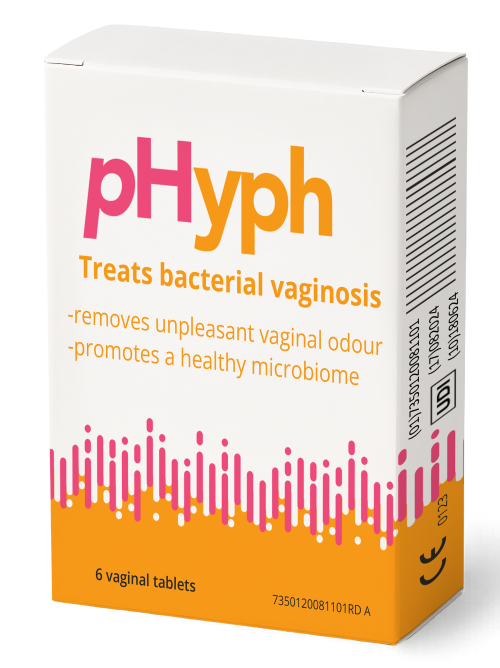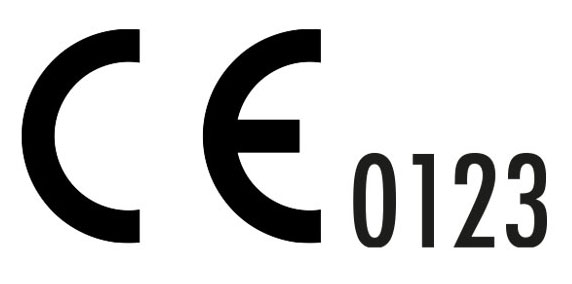pHyph
pHyph is a CE-marked vaginal treatment
treats bacterial vaginosis without antibiotic promotes healthy microbiome effective symptom reduction for bacterial vaginosis
pHyph’s efficacy is clinically proven and CE-marked under MDR. pHyph is an effective, antibiotic-free BV treatment that is documented also to strengthen the vaginal microbiome.

Harnessing the power of the microbiome
Treats bacterial vaginosis without antibiotics

Restores vaginal pH to natural levels

No risk of secondary yeast infection

Promotes a healthy vaginal microbiome
At first day of treatment many patients see a relief in symptoms and at day 7 nearly 70% report absence of symptoms. A healthy microbiome is resilient to new infections and after 35 days, 100% of patients are still free from BV, compared to 54-77% with antibiotics. a secondary vaginal fungal infection but with pHyph there is no increased risk of yeast.
Mode of action
pHyph is formulated to a vaginal tablet and has no antimicrobial properties; instead, it positively impacts the vaginal environment by lowering pH, dissolving and preventing growth of biofilm, and promoting the growth of lactobacilli. The active ingredient GDL in pHyph is well-documented, safe, and already approved as a food additive. pHyph does not contain antibiotics or antifungals, and therefore does not lead to antimicrobial resistance.

Medical effect
pHyph provides symptom relief from the first day for most women. The bothersome odor decreases after just one day, and after 7 days, almost 90% report decrease in symptoms. Symptoms are completely resolved in nearly 70% of patients after completing a treatment course with pHyph. *
*6 tablets, assessment on day 7
Promotes a healthy microbiome

Treatment with antibiotics have a recurrence rate of 23-46% compared to treatment with pHyph where the risk of recurrence is only 5,6-13,9%.
Treats bacterial vaginosis without antibiotics

Patient´s symptom assessment of fishy smell
Rapid symptom relief is crucial for the treatment of bacterial vaginosis. At day 7, 77-89%* see reduction in fishy smell and absence of fishy smell is seen by 63-66%*
* CL3-2 n=61 patients, CL3 n=152 patients
No secondary yeast infection

Current treatment with antibiotics give a secondary vaginal fungal infection in 5,6-17% of patients within 30 days from start of treatment compared to treatment with pHyph where there are no secondary fungal infections.
Bacterial vaginosis
Bacterial Vaginosis Limits Life
Bacterial vaginosis is very limiting for women. The most common symptom of BV is an unpleasant odour from the increased vaginal discharge. The odour can be very intense and causes immense stress and suffering for women with BV. According to our own survey of 1,000 women (2020), 95% of women worry about smelling bad when they have vaginal symptoms, and 57% cannot exercise and stay active as they usually do. Because of the high recurrence rate of bacterial vaginosis, 90% of respondents worry about the symptoms returning, even when they are not currently experiencing issues.
Causes
In bacterial vaginosis, the vaginal pH is elevated compared to the normal state. This promotes the growth of primarily the bacteria Gardnerella vaginalis, leading to an imbalance in the microbiome (bacterial flora). The infectious bacteria begin to proliferate and form a film, known as a biofilm. Under this, the bacteria are further protected and thrive. pHyph lowers the pH to a normal level (4.5), dissolves and prevents biofilm formation, and restores the healthy microbiome in the vagina, thereby reducing the risk of new episodes of bacterial vaginosis.
Bacterial vaginosis can occur for no apparent reason and sometimes as a result of known factors such as a new sexual partner, bathing, or life changes like pregnancy or menopause.

Medical Need

Treatment and Recurrence
Bacterial vaginosis is currently treated with antibiotics or antiseptics that simply kill the infectious bacteria. The treatments available are often effective in the short term, and the infection typically resolves within a week. However, because antibiotics and antiseptics negatively affect the vaginal microbiome, an imbalance often occurs, leading to a recurrence of BV. Recurrences are very common; 23-46% of patients treated with antibiotics have a recurrence within 35 of days of treatment.

Secondary Yeast Infection
Treatment of bacterial vaginosis with antibiotics leads to secondary fungal infections (Candida infection) in 6-17% of patients within 30 days. While Candida is a normal component of the vaginal flora, it typically does not cause infection when the microbiome is healthy. However, antibiotics negatively impact the microbiome, reducing its resilience and allowing Candida to cause infection.

Antimicrobial Resistance
The WHO has identified antimicrobial resistance (AMR) as a global threat to public health, referring to it as ”the silent pandemic,” with approximately 30,000 people in the EU dying each year as a result of AMR. It is crucial to have access to effective antibiotics when they are truly needed to treat serious infections. A significant amount of antibiotics is prescribed for treating bacterial vaginosis, in Sweden accounting for 2,3% of total antibiotic prescriptions. Promoting alternatives to antibiotic treatments and increasing awareness of proper usage are essential in the fight against antimicrobial resistance.
CE mark and Medical Device Regulation, MDR
pHyph is approved for
- Treatment of bacterial vaginosis
- Treatment of unpleasant dodur caused by bacterial vaginosis
- Promoting a healthy vaginal microbiome
pHyph is a Class IIb medical device assessed under MDR. That pHyph is now CE-marked under the MDR means that the product has been assessed as both safe and effective. The MDR regulations replace the previous Medical Device Directive (MDD) and impose stricter requirements on clinical documentation than the previous directive. After 2027, products without MDR approval may no longer be sold within the EU.

